- Home
- Science
- Science Features
- Google Is Letting You Inside Its Moonshot Lab to Justify Its Existence
Google Is Letting You Inside Its Moonshot Lab to Justify Its Existence

Now, the 46-year-old in charge of Alphabet's moonshot factory wants to lift the curtain a little more and tell you how the place really works.
In a blog post Thursday, Teller outlined some of the principles that he says help keep X - formerly Google X - hungry and on track. His bottom-line argument? Innovation is a machine that requires constant fine-tuning and upkeep, with protocols and a very specific kind of culture to keep things moving. But don't be fooled. While the post dresses itself as a how-to guide for innovators, it seems above-all a rhetorical argument meant to defend his organization's very right to exist.
This might surprise you. Alphabet's pie-in-the-sky R&D lab often seems like one of the company's crown jewels. Why shouldn't it exist?
To understand what's really at stake, we have to talk about the extremely uncomfortable tension that's inherent to running an innovation center inside one of the world's most visible companies. In a nutshell, Alphabet is under two competing mandates: One is to keep investors happy by not overspending and delivering reliable returns. The other is to find new opportunities where Alphabet - and Google - can make a difference and keep generating those returns far into the future.
Teller's job is about striking a balance between those two missions. Although his blog post is peppered with colorful details discussing the size of his teams and when they decide to suspend a project that isn't working out, it's all geared toward showing shareholders that it is spending their money responsibly:
"Being a 'corporate lab' is a difficult balancing act: place big bets on the future, but don't spook the people giving you the money. As an Other Bet (one of the Alphabet divisions that's not Google), we want to be good stewards of the resources invested here and deliver a good return so that we're trusted to keep the factory open for years to come.
"We look for opportunities to balance X's overall portfolio sensibly, and aim for diversity: a mix of hardware and software, a mix of industries and problems, a mix of ideas that will take more (closer to 10 years) or less (closer to 5 years) time to have an impact. We have clear budgets and limitations; we can aspire to creating significant growth for Alphabet without significantly growing ourselves."
Teller is extremely careful to define the limits of X's research, a move that stands in stark contrast to the rest of Silicon Valley, where unbounded failure and experimentation is held up as an unqualified good.
In this respect, Alphabet is one of the few tech companies that is held to a slightly different standard. Shareholders fully expect money in their pockets, but also revolutionary technologies that promise to change everything about how we live, work and play. Many companies can offer one or the other, but rarely both - at least, not without making substantial investments in R&D.
In recent months, shareholders have stepped up their scrutiny of Alphabet's financial performance. Lackluster earnings reports and probing questions by investors over the company's spending helped lead to the appointment of Ruth Porat, a former Morgan Stanley executive, as chief financial officer. As my colleague Hayley Tsukayama wrote this week:
"Many analysts credit her with keeping expenses in line, and for giving shareholders more visibility into Google's spending. On an earnings call Thursday, Porat stressed repeatedly that Alphabet believes it can balance fiscal responsibility with investment in innovation."
Google's corporate restructuring last year into Alphabet was motivated by similar pressures, according to some analysts. Although the restructuring helped show more clearly the strength of Google's core business - providing a boon to investors - a side effect of that was to shine a brighter spotlight on Alphabet's Other Bets, some of which have not fared so well under the attention.
Take Boston Dynamics, the robotics company that Alphabet said this year it was looking to sell. One big reason Boston Dynamics is being spun off is because it seemingly can't come up with products that anyone wants to buy. The company was spending too much of its budget on projects that wouldn't come to fruition for a decade, according to internal company communications obtained by Bloomberg News.
The same spending problems may have contributed to a wave of controversy surrounding Nest, Alphabet's smart-thermostat maker. Citing insider interviews, the Verge reported last month that it was heightened financial pressure - not just the management style of Nest founder Tony Fadell - that led to a breakdown in the company. The added fiscal scrutiny could be traced directly back to the Google restructuring, according to the report.
In light of all that, it'd be no surprise if X itself is now feeling the heat, too. A spokesperson for X didn't immediately respond to a request for comment, but the tone of Teller's blog post is one of a person who is trying to convince someone (inside or outside the company, or probably both) that what he does is really worth doing. And that's consistent with a message that co-founder Larry Page has spent years hammering away on, too.
"My struggle in general is to get people to spend money on long-term R&D," Page said on an investor call last year. "You should actually be asking me to make more significant investments."
© 2016 The Washington Post
Catch the latest from the Consumer Electronics Show on Gadgets 360, at our CES 2026 hub.
Related Stories
- Samsung Galaxy Unpacked 2025
- ChatGPT
- Redmi Note 14 Pro+
- iPhone 16
- Apple Vision Pro
- Oneplus 12
- OnePlus Nord CE 3 Lite 5G
- iPhone 13
- Xiaomi 14 Pro
- Oppo Find N3
- Tecno Spark Go (2023)
- Realme V30
- Best Phones Under 25000
- Samsung Galaxy S24 Series
- Cryptocurrency
- iQoo 12
- Samsung Galaxy S24 Ultra
- Giottus
- Samsung Galaxy Z Flip 5
- Apple 'Scary Fast'
- Housefull 5
- GoPro Hero 12 Black Review
- Invincible Season 2
- JioGlass
- HD Ready TV
- Laptop Under 50000
- Smartwatch Under 10000
- Latest Mobile Phones
- Compare Phones
- Realme Neo 8
- OPPO Reno 15 FS
- Red Magic 11 Air
- Honor Magic 8 RSR Porsche Design
- Honor Magic 8 Pro Air
- Infinix Note Edge
- Lava Blaze Duo 3
- Tecno Spark Go 3
- Acer Chromebook 311 (2026)
- Acer Chromebook Spin 311
- Lenovo Idea Tab Plus
- Realme Pad 3
- Moto Watch
- Garmin Quatix 8 Pro
- Haier H5E Series
- Acerpure Nitro Z Series 100-inch QLED TV
- Asus ROG Ally
- Nintendo Switch Lite
- Haier 1.6 Ton 5 Star Inverter Split AC (HSU19G-MZAID5BN-INV)
- Haier 1.6 Ton 5 Star Inverter Split AC (HSU19G-MZAIM5BN-INV)




![[Sponsored] Haier C90 OLED TV | Dolby Vision IQ, 144Hz OLED and Google TV in Action](https://www.gadgets360.com/static/mobile/images/spacer.png)









